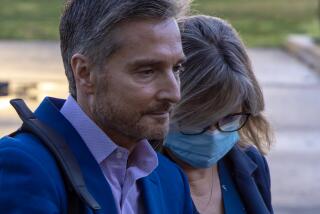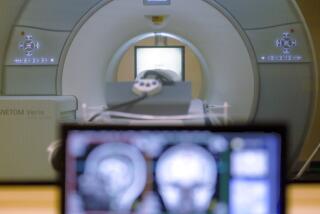Brain-Damaged Woman Breaks Her Silence
- Share via
ARKANSAS CITY, Kan. — If Tracy Gaskill could, she would spend her day eating -- strawberry swirled ice cream, juicy watermelons and vanilla milkshakes from Sonic.
But most of all, Tracy would eat pizza. Supreme, she says -- her one-word response recalling a popular Pizza Hut offering topped with pepperoni, beef, pork, green peppers, onions and mushrooms.
Her words delight her grandparents, Don and Stella Gaskill. Since a 2002 traffic accident damaged their granddaughter’s brain, Tracy has been silent, nourished through a feeding tube in her stomach. For about 2 1/2 years, her daily diet through that tube has consisted of five cans of a high-calorie liquid called Jevity.
But during the last few months, Tracy, now 30, gradually began using her long-dormant throat muscles again.
She laughed. She hummed. She sipped water.
Now she can talk -- mostly in one-word answers that brought tears to her grandparents’ eyes.
And she can eat.
Before the accident, Tracy was a student at Cowley County Community College who dreamed of becoming an art teacher.
She also worked as an aide caring for disabled children at Creative Community Living, the company that took over their housing and care after the state hospital closed in Arkansas City.
But all that seems like a lifetime ago -- before the evening of Sept. 3, 2002, when Tracy rolled her pickup truck while driving between Arkansas City and Winfield.
The cause of the accident is unknown.
She was taken by helicopter to a Wichita hospital, where her grandparents were told that she was critically injured and would probably not survive past noon the following day.
Today, a poster from the children that Tracy once cared for hangs on the wall beside her hospital bed at Medicalodge North. On it are pasted photos of her former young charges with a hand-scrawled message: “Hi Tracy. Thinking about you. We miss you. Everyone wishes you the best.”
That same poster has followed Tracy from the surgical intensive care unit where she spent a month to the select specialty hospital room where the then semi-comatose Tracy had the ventilator removed. It remains on display at the long-term care facility where she now lives.
Unlike Terri Schiavo, who was in a persistent vegetative state, Tracy eventually showed signs that she recognized people and was aware to a limited extent of her surroundings. But she couldn’t speak.
Her doctor, David Schmeidler, has made no significant changes to her medication. He credits her ability to communicate again to her constant care and to occupational and speech therapy. But, most of all, her doctor credits prayer.
While Schmeidler doubts that Tracy will ever fully recover, he believes that with intensive therapy, she will continue to improve.
“The brain is an amazing thing,” Schmeidler said.
In February, the Gaskills found renewed hope as they followed news reports of another Kansas woman who began talking 20 years after a brain injury. They prayed for a similar miracle for Tracy.
Like the Gaskills’ granddaughter, Sarah Scantlin had been mostly oblivious to the world around her.
Sarah was an 18-year-old college freshman when she was hit by a drunk driver as she walked to her car after celebrating with friends at a club on Sept. 22, 1984.
Sarah had started talking in mid-January, although she asked staff members not to tell her parents until Valentine’s Day to surprise them.
But by early February, Sarah could not wait any longer and made the phone call that thrilled her parents, sparked intense media coverage and brought hope to families of other brain-injured patients.
For almost three years, the Gaskills have visited their granddaughter every day. Don comes every morning, Stella every evening. Tracy’s mother died the year before the traffic accident. Tracy’s father has his own health problems and doesn’t live nearby.
About a month ago, Don had just returned home when he got his own long-awaited phone call. It was Tracy.
“She said, ‘Grandpa.’ That did it,” Don said. He would learn later that Tracy had also told him on the phone that she loved him.
He didn’t hear that part -- he was crying too hard.
Stella cried too as she phoned family and friends to tell them the news.
And she says she hasn’t quit crying yet.
“We have more expectations, more hope than before,” Don said. “Only God knows what will happen from here. We always had hope that this day would come.”
Soon, the feeding tube to Tracy’s stomach will be removed. The injectable tube that the staff also used just days ago to feed her pureed food by mouth also sits unused in her hospital room’s sink.
Now each passing day brings more improvement in Tracy’s condition -- more words, perhaps even a food to rediscover.
In recent weeks, she had her first cookie in three years -- oatmeal raisin. She had a taste of fresh watermelon. An aide stopped in briefly to bring her a promised vanilla milkshake from Sonic.
The staff even muses that Tracy might be able to handle pizza now.
Her family hopes that, like Scantlin’s recovery, Tracy’s story will hearten the families of other brain-injured patients.
“A happy ending,” Stella said.
More to Read
Sign up for Essential California
The most important California stories and recommendations in your inbox every morning.
You may occasionally receive promotional content from the Los Angeles Times.










